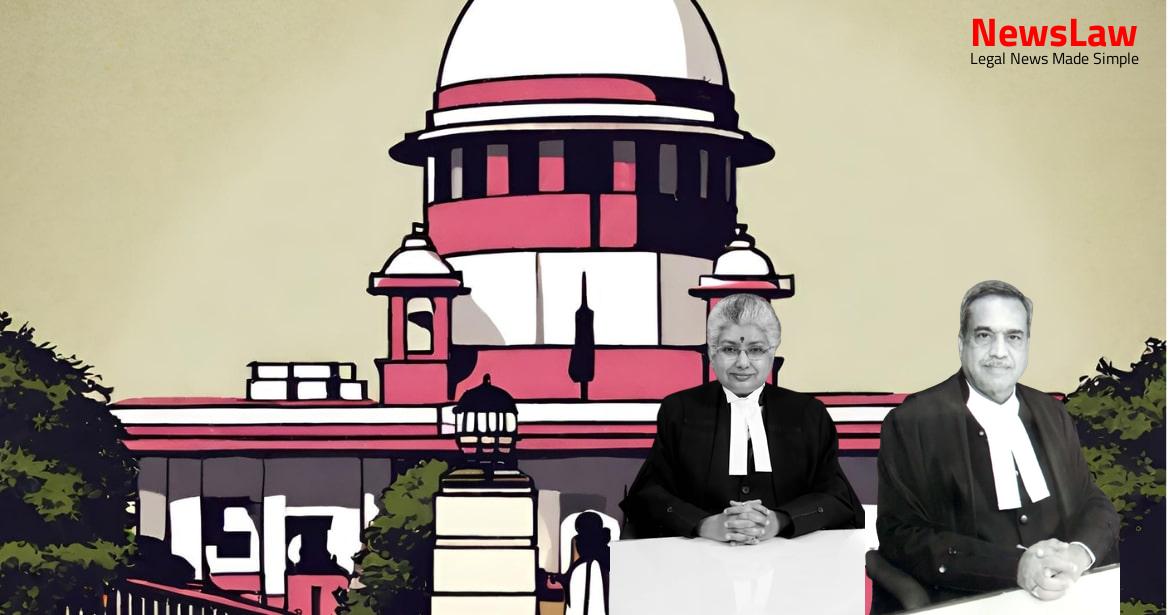In a recent legal case, the court delved into the complexities of fraud allegations and legal constraints in a dispute involving an assignee’s claim. The court’s meticulous analysis highlighted the significance of providing precise details when alleging fraud to ensure a fair legal process. This summary focuses on the court’s emphasis on specific particulars and the dismissal of the suit under the SARFAESI Act, showcasing the importance of abiding by legal standards in litigation.
Facts
- The original plaintiff availed loan facility as a guarantor for defendant No.3.
- An assignment agreement dated 30.06.2018 initiated proceedings against the plaintiff under SARFAESI Act.
- The plaintiff filed a Civil Suit seeking declaration that defendant No.1 is not a secured creditor.
- An application under SARFAESI Act was returned by DRT due to non-compliance.
- The plaintiff argued that no dues were outstanding and the assignment agreement was null and void.
- A resolution plan was approved, extinguishing the financial creditor’s claims.
- The assignee issued a possession notice, demanding payment and allotment of shares.
- The assignor had assigned all rights to the assignee, leading to the initiation of IBC proceedings against the corporate debtor.
- Civil court’s jurisdiction barred by Section 34 of the SARFAESI Act
- DRT has competence to decide the matter
- Learned Single Judge of the High Court dismissed the application and suit on grounds of jurisdiction
- Appeal dismissed by Division Bench of the High Court citing Section 34 of the SARFAESI Act
Also Read: Legal Analysis on Conviction Based on Sole Testimony of Prosecutrix
Arguments
- Appellant’s counsel vehemently argues that the suit is not barred under Section 34 of the SARFAESI Act as fraud allegations were made.
- Counsel contends that the assignment deed is not fraudulent as claimed by the plaintiff.
- Allegations of fraud lack material particulars and fail to meet the legal standards.
- Appellant argues that no dues are payable as the corporate debtor was discharged under the IBC resolution plan.
- Respondents’ counsel asserts that the fraud allegations in the pleadings are unsubstantiated and amount to an abuse of process.
- High Court’s failure to consider the fraud allegations properly is highlighted by the respondents’ counsel.
- DRT cannot grant the relief of declaring the assignment agreement null and void as sought by the appellant under the SARFAESI Act.
- The plaintiff – appellant alleges fraud with respect to the assignment agreement dated 30.06.2018.
- They argue that the assignment agreement is fraudulent because after full payment as per the approved resolution plan under the IBC, and the original corporate debtor is discharged, there should be no debt by the plaintiff as a guarantor.
- They claim that the assignment deed is fraudulent due to this reason.
- The plaintiff – appellant contends that the suit alleging fraud regarding the assignment deed should be maintainable, and the bar under Section 34 of SARFAESI Act should not be applicable.
Also Read: Legal Analysis on Concurrent Sentences in Drug Trafficking Cases
Analysis
- Litigants must provide precise and specific details when alleging fraud or improper conduct.
- General allegations of fraud, undue influence, or coercion are insufficient; full particulars must be set forth.
- Cases involving fraud, undue influence, or coercion can only be decided based on the particulars as laid out.
- Clever drafting to bypass legal limitations will not be allowed in court proceedings.
- It is essential to plead fraud with necessary particulars for it to be considered by the court.
- Several cases have emphasized the importance of providing full details when alleging fraud or improper conduct.
- Using the words ‘fraud’ or ‘fraudulent’ without specific particulars is not sufficient to establish fraud.
- Mere mention of fraud does not satisfy the test of fraud in legal proceedings.
- Just mentioning ‘fraud’ does not make the assignment deed fraudulent.
- Whether there is a legally enforceable debt post resolution plan approval is a matter for the DRT to decide.
- The plaintiff’s liability and any dues payable need to be determined through SARFAESI Act proceedings.
- The case should be dismissed as the allegations of fraud lack specific details and are an attempt to bypass legal restrictions.
- The suit filed by the plaintiff – appellant was not maintainable due to the bar under Section 34 of the SARFAESI Act.
- The courts did not err in rejecting the plaint/dismissing the suit in light of the SARFAESI Act provisions.
- No opinion expressed on merits for either party on the specific issues mentioned.
- The appellant may choose to challenge the proceedings before the DRT under Section 17 of SARFAESI Act, citing reasons such as the assignee not being a secured creditor and lack of amount due post IBC proceedings against the corporate debtor.
- If such an application is filed within two weeks, it will be considered in accordance with the law and on its merits.
Also Read: Legal Jurisdiction and Award Finality in Arbitration Dispute
Decision
- Present appeal has failed and is dismissed.
- No order as to costs in the circumstances of the case.
Case Title: ELECTROSTEEL CASTINGS LIMITED Vs. UV ASSET RECONSTRUCTION COMPANY LIMITED (2021 INSC 794)
Case Number: C.A. No.-006669-006669 / 2021



